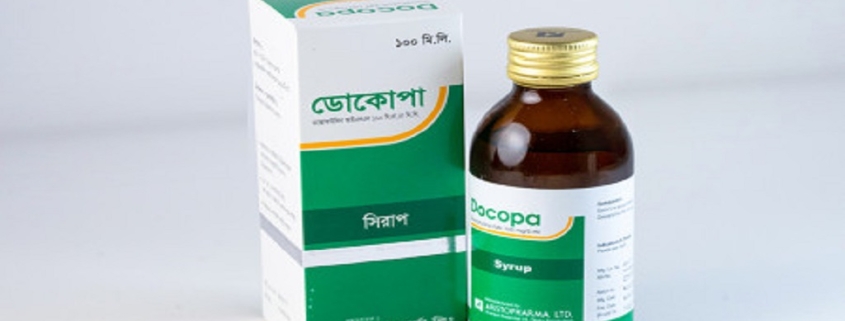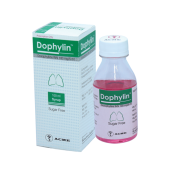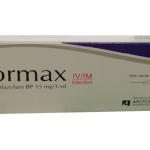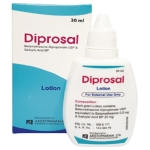Docopa (Doxophylline INN)
Doxophylline INN
Description
Doxophylline is a new generation xanthine derivative which has a dioxolane group at N-7 position of its chemical structure. Doxophylline inhibits phosphodiesterase activities. Moreover, Doxophylline appears to have a less affinity towards adenosine A1 and A2 receptors which is account for the better safety profile of the drug. Doxophylline also inhibits platelet activating factor and the generation of leukotrienes.
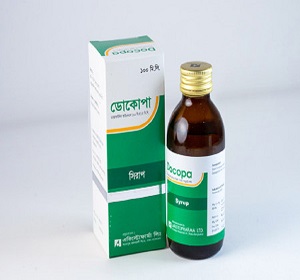
Presentation
Docopa 200 Tablet: Each film coated tablet contains Doxophylline INN 200 mg.
Docopa Tablet: Each film coated tablet contains Doxophylline INN 400 mg.
Docopa Syrup: Each 5 ml syrup contains Doxophylline INN 100 mg.
Indications
Docopa (Doxophylline) is used to treat asthma, COPD and bronchospasm.
Dosage & Administration
Adult: 400 mg daily in the evening. However, in certain cases, 400 mg twice daily is recommended on the basis of the clinical response. Doses as high as 1200 mg/day (400 mg 3 times daily) may also be prescribed. In elderly patients with concomitant cardiovascular, hepatic and renal diseases recommended dosage should be 200 mg twice daily.
Children (above 6 years of age): The recommended dosage of Doxophylline is 6 mg/kg twice daily. The dose may be increased up to 18 mg/kg daily on the basis of clinical response.
| Dosage | Weight of the Child | ||||||
| 10 kg | 15 kg | 20 kg | 25 kg | 30 kg | 35 kg | 40 kg | |
| 6 mg/kg b.i.d | 3 ml | 4.5 ml | 6 ml | 7.5 ml | 9 ml | 10.5 ml | 12 ml |
| Total Daily Dose | 6 ml | 9 ml | 12 ml | 15 ml | 18 ml | 21 ml | 24 ml |
Contrainidications
Doxophylline is contraindicated in patients with acute myocardial infarction and hypotension. It is also contraindicated in individuals who have shown hypersensitivity to its components.
Warning & Precautions
The half-life of xanthine derivative is influenced by a number of variables. It may be prolonged in patients with liver disease, congestive heart failure and in those patients taking certain other drugs (erythromycin, troleandomycin, lincomycin, allopurinol, cimetidine, propranolol and anti-flu vaccine). In these cases, a lower dose of Doxophylline may be needed. Phenytoin and other anticonvulsants may cause shorter mean half-life and in these cases higher doses of Doxophylline may be needed.
Side effects
After administration occasionally nausea, vomiting, headache, etc. may occur.
Drug interaction
Doxophylline should not be administered together with other xanthine derivatives. Toxic synergism with ephedrine has been documented for xanthines. Like other xanthines, concomitant therapy with erythromycin, troleandomycin, lincomycin, allopurinol, cimetidine, ranitidine, propranolol and anti-flu vaccine may decrease the hepatic clearance of xanthines causing an increase in blood levels.
Use in special groups
Use in pregnancy: Animal reproduction studies indicate that Doxophylline does not cause fetal harm when administered to pregnant animals nor can affect reproduction capacity. However, since there is limited experience in human during pregnancy, Doxophylline should be given to pregnant women only if clearly needed.
Use in nursing mothers: Doxophylline is contraindicated in nursing mothers.
Packing
Docopa 200 Tablet: Each box contains 100 tablets in alu-alu blister pack.
Docopa Tablet: Each box contains 60 tablets in alu-alu blister pack.
Docopa Syrup: Each bottle contains 100 ml syrup.

